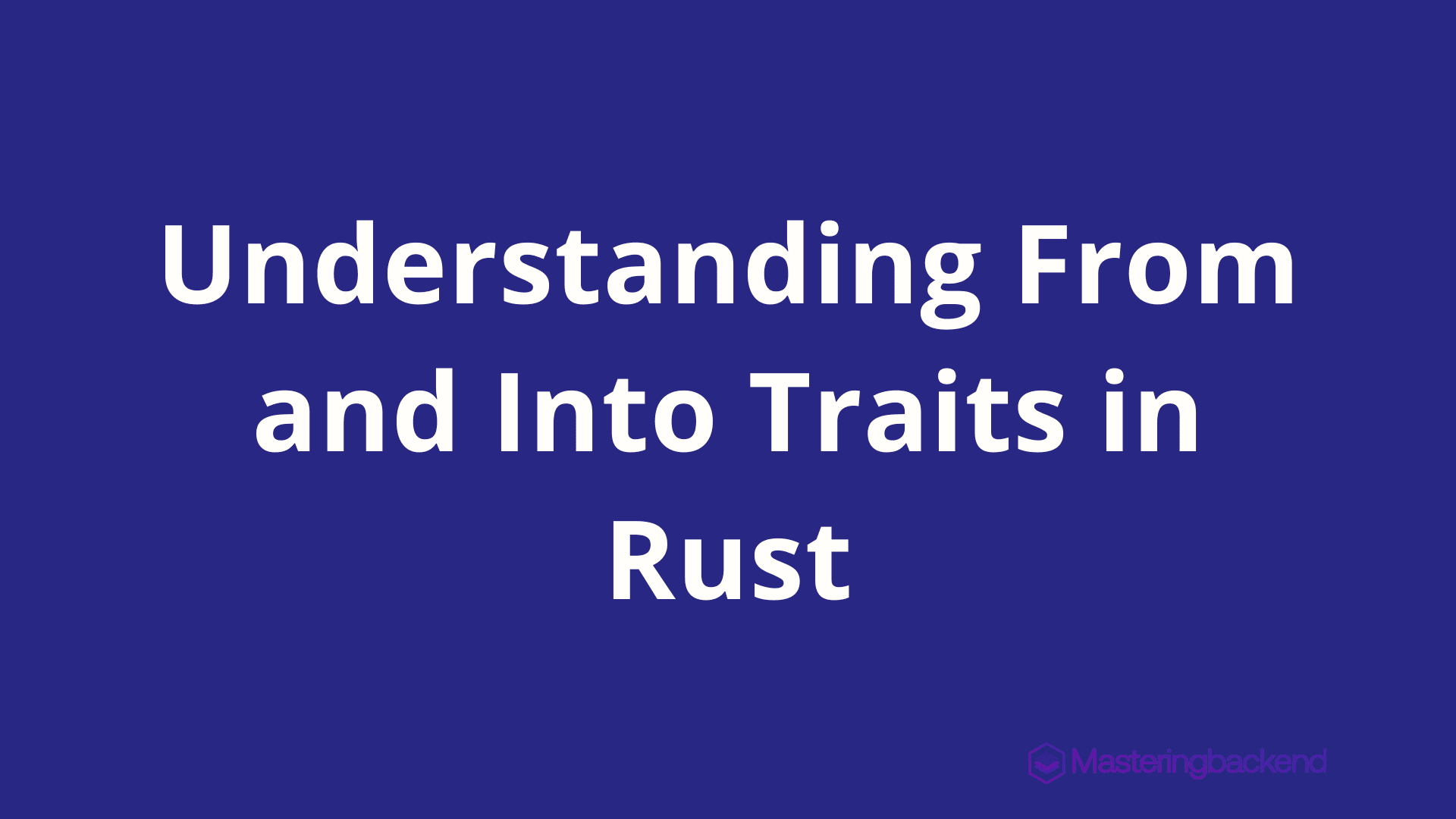Have you ever struggled with converting between types in your Rust code? If you have worked with Rust for any amount of time, you've encountered situations where you need to transform one type into another. This is where Rust's From and Into traits come in — they're some of the most elegant parts of Rust's type system.
I believe these conversion traits are among the most underappreciated features in Rust, even though they make code so much more readable and maintainable.
What Are From and Into Traits?
The From and Into traits in Rust's standard library provide a consistent way to convert between types. They are reciprocal — implementing one often gives you the other for free. The From trait allows you to define how to create your type from another type.
Example:
impl From<i32> for MyNumber {
fn from(value: i32) -> Self {
MyNumber { value }
}
}The Into trait is the flip side, allowing conversion into another type
Example:
// This is often automatically implemented when you implement From
let my_num: MyNumber = 42.into(); // Convert i32 into MyNumberThe best part? When you implement From, you get Into for free! This is neat and easy to understand, without any blind spots, as the compiler ensures type safety throughout.
Why Use From and Into
So this is one of the biggest ones, especially when dealing with error types. From trait implementations make the ? operator in Rust work like magic.
Coming from languages without these conversion traits, I was amazed at how much cleaner error handling becomes. The ? operator relies on the From trait to automatically convert between error types.
Example with error handling:
fn process_data() -> Result<ProcessedData, MyError> {
let raw_data = fetch_data()?; // IoError automatically converts to MyError
let validated_data = validate(raw_data)?; // ValidationError converts to MyError
Ok(ProcessedData::new(validated_data))
}Even though error handling in Rust looks complex at first, the From trait makes it incredibly ergonomic once you understand it. You should check this pattern out in your error types.
Creating Intuitive APIs with From/Into
You know, you can make your APIs much more flexible by accepting types that implement Into<T> rather than just T itself?
Because of Rust's trait system, you can write functions that accept a wide range of input types that can be converted to your desired type, making your APIs more ergonomic without sacrificing type safety.
Here are some benefits of this approach:
More flexible function parameters
Example:
// Instead of this:
fn process_name(name: String) {
println!("Processing: {}", name);
}
// Do this:
fn process_name<T: Into<String>>(name: T) {
let name = name.into(); // Convert to String
println!("Processing: {}", name);
}This allows calling the function with both
Stringand&str:
process_name("hello"); // &str
process_name(String::from("world")); // StringThe API is now more intuitive without any performance penalty
As you can see, this pattern reduces friction for users of your code while maintaining Rust's strong guarantees.
Custom Type Conversions Made Simple
Ohh, the struggle of writing conversion code over and over is real in many languages, but in Rust it's actually …. different.
But seriously, From and Into provide a standardized way to convert between your custom types, making your codebase more consistent and easier to understand.
Implementing conversions between domain types:
Example:
struct User {
name: String,
email: String,
active: bool,
}
struct UserDTO {
full_name: String,
email_address: String,
}
impl From<User> for UserDTO {
fn from(user: User) -> Self {
UserDTO {
full_name: user.name,
email_address: user.email,
}
}
}Now, converting is clean and consistent:
let user = get_user_from_database();
let dto: UserDTO = user.into(); // Simple conversionMultiple conversions become chainable
In Rust, you get very clear conversion chains that are easy to follow, without all the boilerplate of other languages.
let id: UserId = input.into(); // String -> UserId
let user: User = id.into(); // UserId -> UserPractical Examples
Let me show you how these traits apply in real projects:
Converting between domain types and DTOs
struct Product {
id: u64,
name: String,
price: u32, // In cents
description: Option<String>,
}
// API representation
struct ProductResponse {
id: String,
name: String,
price: f64, // In dollars
description: String,
}
impl From<Product> for ProductResponse {
fn from(product: Product) -> Self {
ProductResponse {
id: product.id.to_string(),
name: product.name,
price: (product.price as f64) / 100.0,
description: product.description.unwrap_or_default(),
}
}
}Handling different string types efficiently
This is such a big flex because converting between string types in Rust becomes trivial with these traits.
struct Name(String);
impl From<&str> for Name {
fn from(s: &str) -> Self {
Name(s.to_owned())
}
}
impl From<String> for Name {
fn from(s: String) -> Self {
Name(s)
}
}Working with numeric types safely
struct Percentage(u8);
impl TryFrom<i32> for Percentage {
type Error = &'static str;
fn try_from(value: i32) -> Result<Self, Self::Error> {
if value < 0 || value > 100 {
Err("Percentage must be between 0 and 100")
} else {
Ok(Percentage(value as u8))
}
}
}TryFrom and TryInto: Handling Fallible Conversions
Do not even mention conversions without discussing fallible conversions, like how are you supposed to handle possible failures in converting between types?
Rust provides TryFrom and TryInto traits for conversions that might fail, with all the same benefits as From and Into but returning a Result type.
Example with validation:
struct PositiveNumber(u32);
impl TryFrom<i32> for PositiveNumber {
type Error = String;
fn try_from(value: i32) -> Result<Self, Self::Error> {
if value < 0 {
Err(format!("Cannot create PositiveNumber from negative value: {}", value))
} else {
Ok(PositiveNumber(value as u32))
}
}
}
// Usage:
let positive = PositiveNumber::try_from(-10);
match positive {
Ok(num) => println!("Got positive number: {}", num.0),
Err(e) => println!("Conversion failed: {}", e),
}
// Or with ? operator:
fn get_positive(val: i32) -> Result<PositiveNumber, String> {
let positive = PositiveNumber::try_from(val)?;
Ok(positive)
}When to use TryFrom vs From
Use
Fromwhen conversion cannot failUse
TryFromwhen conversion might fail (e.g., parsing, validation)This ensures your API communicates potential failure points clearly
Performance Considerations and Best Practices
This is a no-brainer. Conversions can be a source of hidden performance costs, so here are some things to consider:
Be mindful of allocations in
Fromimplementations
// Potentially expensive: Creates a new String
impl From<&str> for MyType {
fn from(s: &str) -> Self {
MyType { name: s.to_owned() }
}
}
// More efficient for some cases: Borrows instead when possible
impl<'a> From<&'a str> for MyType<'a> {
fn from(s: &'a str) -> Self {
MyType { name: s }
}
}Consider implementing
AsReffor reference conversions
impl AsRef<str> for MyType {
fn as_ref(&self) -> &str {
&self.name
}
}When to use references vs. owned values in conversions
Use owned conversions
(From)when you need to transform or own the dataUse reference conversions
(AsRef)when you just need to view data as another type
Common Pitfalls and How to Avoid Them
Tooling, God bless the Rust compiler — it will help you catch many issues with From and Into implementations, but here are some common pitfalls:
Avoid circular
Fromimplementations
The compiler will catch this, but it's good to be aware
// Don't do this!
impl From<TypeA> for TypeB { /* ... */ }
impl From<TypeB> for TypeA { /* ... */ }Be careful with type inference and
.into()
// This won't compile - ambiguous
let x = "hello".into();
// This works - explicit type
let x: String = "hello".into();Don't implement
Intodirectly (implementFrominstead)
// Don't do this
impl Into<TargetType> for SourceType { /* ... */ }
// Do this instead
impl From<SourceType> for TargetType { /* ... */ }Summary
Rust's From and Into traits give us a standardized way to handle conversions between types across our entire codebase. These traits make our APIs more intuitive, our error handling smoother, and our code more consistent.
Because most conversion patterns in Rust use these traits, you can express complex mutations clearly without the messy conversion code you'd see in other languages.
So next time you write a conversion function, stop and ask yourself—should this be a From implementation instead? Your future self (and your teammates) will thank you; too bad you don’t stop and think while video coding.




